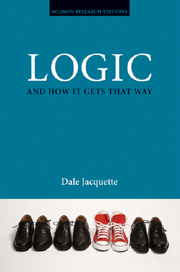Book contents
- Frontmatter
- Contents
- Preface
- Introduction: Logic, philosophy, analysis
- 1 Logical form
- 2 Monkey raisins
- 3 The secret life of truth-functions
- 4 Reference and identity
- 5 Intensional versus extensional logic and semantics
- 6 Truth
- 7 Logical and semantic paradoxes
- Conclusion: Moral lessons of logic
- Notes
- References
- Index
5 - Intensional versus extensional logic and semantics
- Frontmatter
- Contents
- Preface
- Introduction: Logic, philosophy, analysis
- 1 Logical form
- 2 Monkey raisins
- 3 The secret life of truth-functions
- 4 Reference and identity
- 5 Intensional versus extensional logic and semantics
- 6 Truth
- 7 Logical and semantic paradoxes
- Conclusion: Moral lessons of logic
- Notes
- References
- Index
Summary
AGAINST THE SEMANTIC GRAIN
If in logic we must ultimately have to do with objects and their properties, then it is not surprising to find some logicians and philosophers choosing or being intuitively compelled to begin with objects, making objects logically more basic than properties as the most basic, and others beginning instead with properties, for whatever contrary reasons or impulses, making properties logically more basic than objects. Those who begin with objects, and thus necessarily with entities or existent objects, are extensionalists in logic and semantics; those who begin with properties and thus unavoidably both with instantiated and uninstantiated combinations of properties, or, in any case, with logically possible properties in the abstract, are intensionalists.
Thus, it is no accident that Quine, an arch extensionalist, whose later recently collected writings include the title 2001 essay, “Confessions of a Confirmed Extensionalist”, prescribes in the first chapter of his 1960 book, Word and Object, “Beginning With Ordinary Things”, which is to say, with existent objects, and in its penultimate chapter VI, recommends a “Flight from Intension”. Extensionalists explain true and false predications as a matter of an existent object belonging to the extension of a predicate, including all and only the existent objects possessing the property represented by the predicate. The reason is obvious if we reflect that extensionalists, beginning with objects rather than properties, can only consider existent objects; since nonexistent objects by reputation do not exist, there are no objects other than existent objects for extensionalists to enlist as the objectual foundation of all logic and semantics.
- Type
- Chapter
- Information
- Logic and How it Gets That Way , pp. 97 - 140Publisher: Acumen PublishingPrint publication year: 2010



